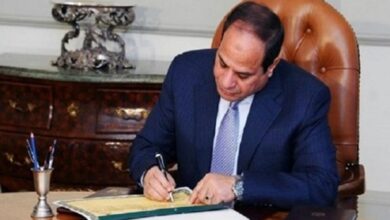As Egyptians head “willingly” today to elect the country’s first parliament since Hosni Mubarak’s resignation, both state-run and independent papers run extensive coverage on security and supervision issues amid the political turmoil.
“Today … Egypt selects the revolution’s parliament” and “Your voice … the first step for civil state,” read the top headlines of Al-Wafd and Al-Gomhurriya respectively.
Many regard today’s polls as a milestone in Egypt’s democratic transition process, hoping the elections will be fair after years of suffering from the monopolization of parliamentary seats by the former ruling National Democratic Party through ballot fraud.
Al-Ahram, a state-run paper, writes that the first stage of parliamentary polls kicked off across 18,000 polling stations in nine governorates, including Cairo, Alexandria, Fayoum, Port Said, Damietta, Kafr al-Sheikh, Assiut and Luxor, supervised by 10,000 judges and 8000 observers.
In other news, the press conference held on the eve of the elections by Field Marshal Hussein Tantawi, head of the Supreme Council of the Armed Forces (SCAF), is highlighted in most private and state-owned papers. During the event, Tantawi said the army’s position will not change in the new constitution, reports independent daily Al-Shorouk.
In his statement, Egypt’s military ruler also urged people to cast their votes without any worries: “The military council will completely cooperate in securing the electoral process with the Interior Ministry.”
On the same front, Al-Shorouk states that police pledged to impose tight security measures “outside” polling stations as well as secure the process of sorting and counting vote cards.
In a related context, privately owned Al-Dostour publishes on its fourth page that the Independent Coalition for Monitoring Elections, comprised of 128 civil society organizations, will take part in monitoring the electoral process by placing observers at each polling station and using electronic monitoring systems as an additional tool for recording any violations that might occur.
Despite the assurance of the ruling military council and the High Elections Commission about introducing all the necessary arrangements that guarantee the fairness of parliamentary elections, Youm7 reports that concerns are raised after the spread of 3000 ballots in the Red Sea Governorate 24 hours before election day.
Al-Shorouk paper also obtained one of the leaked ballots stamped by the Polling Station No. 78, which some candidates regarded as “an indicator of witnessing the same fraud scenario of 2010 parliamentary elections.”
On its front page, Al-Dostour exclusively mentions judges’ reservations over the SCAF decree to hold the elections over two days, rather than one.
Some judges express concerns about leaving the ballot boxes unattended overnight, which makes electing process vulnerable to illegal, corrupt practices, says the report.
Under a headline that reads “Bearing our burden of responsibility for establishing democracy and justice,” the liberal opposition party paper
Al-Wafd devotes two facing pages entirely to its party’s parliamentary candidates, containing a hint about their platforms alongside a picture for each nominee.
In his op-ed, Youm7 Editor-in-Chief Khaled Salah condemns the Coptic Orthodox Church’s alleged interference in the elections by recommending specific candidates’ names to Coptic Christians.
The author stresses that if priests criticize how Islamic groups campaign for their electoral platforms in the name of religion, it is unacceptable in return that some churches direct voters to certain candidate lists.
He concludes his op-ed by giving the church two choices “to correct this mistake, whether denying the allegations giving irrefutable evidence… or apologizing publicly and letting Copts vote freely.”
Egypt's papers:
Al-Ahram: Daily, state-run, largest distribution in Egypt
Al-Akhbar: Daily, state-run, second to Al-Ahram in institutional size
Al-Gomhurriya: Daily, state-run
Rose al-Youssef: Daily, state-run
Al-Dostour: Daily, privately owned
Al-Shorouk: Daily, privately owned
Al-Wafd: Daily, published by the liberal Wafd Party
Youm7: Daily, privately owned
Al-Tahrir: Daily, privately owned
Freedom and Justice: Daily, published by the Muslim Brotherhood's Freedom and Justice Party
Sawt al-Umma: Weekly, privately owned
Al-Arabi: Weekly, published by the Nasserist Party




